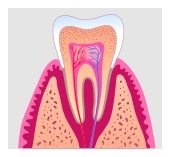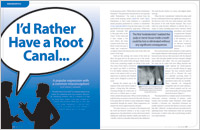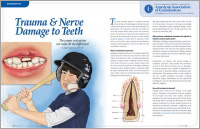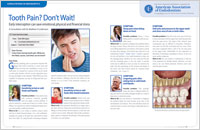Root Canal Treatment
Every tooth consists of three different layers. The outermost and hardest layer is enamel, and the second layer is dentin. The third is pulp, which is the cavernous space where the live tissue and nerve of each tooth is located.
If for any reason the pulp space is exposed to the outside, the tissue becomes contaminated and eventually infected. The exposure of pulp happens in many circumstances, such as when you have a large cavity or a fractured tooth. Your dentist can explain the exact reason for damage to this tissue. In these cases, the treatment is usually root canal treatment.
Root canal treatment is the process of going inside the pulp space and removing the infected, dead tissue. The space is then disinfected and sealed with special materials. Nowadays, root canal treatments are performed with advanced techniques and materials, making them far more comfortable and faster. After root canal treatment is complete, your restorative dentist will usually place a crown on your tooth to safeguard against fracture.
If you have any questions about root canal treatment and you live in or around Holladay, give us a call today!
Related Root Canal/Endodontic Articles
 “I’d Rather Have a Root Canal…”
“I’d Rather Have a Root Canal…”
A common misconception is demystified. Get the real story about this much maligned procedure that eases pain, rather than causes it… Read Article
 Root Canal Treatment For Children’s Teeth
Root Canal Treatment For Children’s Teeth
You may think that if a baby tooth comes out prematurely, it’s no great loss; after all, it was going to fall out anyway, right? Wrong! Primary teeth serve as important guides for the permanent teeth that will replace them. Young children can lose primary (baby) teeth when the pulp, the living tissue inside a tooth, becomes infected as a result of decay or trauma. Losing baby teeth prematurely can allow bite problems to develop. Root canal treatment for children can prevent this. Learn what to look for in your child and what can be done to save baby teeth until they are ready to be lost naturally… Read Article
 Trauma & Nerve Damage to Teeth
Trauma & Nerve Damage to Teeth
Answers to treatment of specific dental injuries – not only do injuries and their treatment vary, but they are also influenced by the type of tooth, whether baby or adult teeth, and their stage of growth and development. From chipped to fractured teeth, modern dentistry’s answers are here and now… Read Article
 Tooth Pain? Don’t Wait!
Tooth Pain? Don’t Wait!
Pain is a protective response that ranges from minor sensitivity to severe pain and informs the body that something is wrong. As for tooth pain, it is caused by a reaction of the nerves inside a tooth’s pulp chamber with the severity dependent upon the type and degree of the stimulus… Read Article

